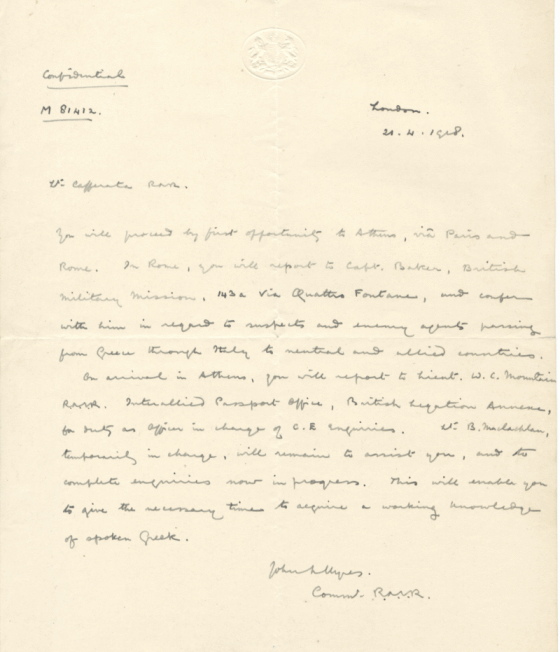When Redmond did finally arrive in Athens the situation he found was very different from that of Switzerland. For a start, Greece was on the allied side in the war, unlike Switzerland which jealously guarded its neutrality. A further contrast was the political instability which had dominated Greek society for years: King Constantine I had feuded with Prime Minister Venizelos over his support for the Germans. (He was, after all, married to Kaiser Wilhelm’s sister and had been educated in Germany.) This ultimately led to Constantine being forced into exile and the “National Schism” between the Royalists and the Venizelists. This conflict would surface again and again in Redmond’s work in Greece.

Redmond's orders to Greece, April 1918
His fluent French had assisted him in his Swiss work, but he didn’t have that advantage in Athens. To this end, instead of resting from the heat of the day, (he wrote that it was about 110° in the shade) he had a Greek lesson. He was also assisted by a Professor Anatassievitch with his Greek translations.
By July, Redmond was able to make an assessment which, although stating that there was much promising material, found much that wasn’t to his satisfaction. In the short time that he had been in Greece, Redmond had developed a great respect for the section head, Commander Myres, who regularly worked from early morning until midnight, with just a hurried lunch and dinner.
Above all though, he complained of being swamped by the number of passport applications he had to deal with – about 1000 per week, for week after week. This raises the obvious question: Why were the British processing so many Greek passport applications? There are, I believe, two elements in the answer. Firstly, there was the reason why so many passport applications were being made during wartime. This was due to the internal conflict between the Royalists and Venizelists, which had led in 1916 to Venizelist military officers carrying out a coup in areas of Northern Greece, Crete and the Aegean. It resulted in the creation of what was virtually a separate state which Greeks from Athens needed a passport to visit. Redmond himself was quite definite about why the British were being used for this purpose – it was because they were trustworthy! He wrote “The English police, as we are called here, have the reputation of being uncorruptible”. (18)